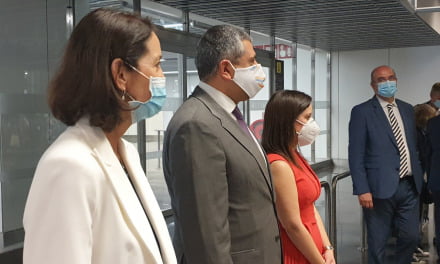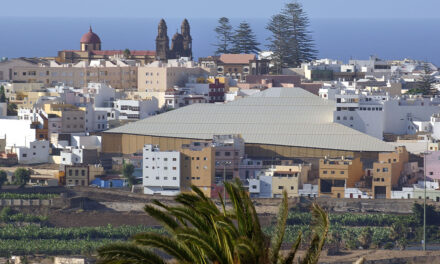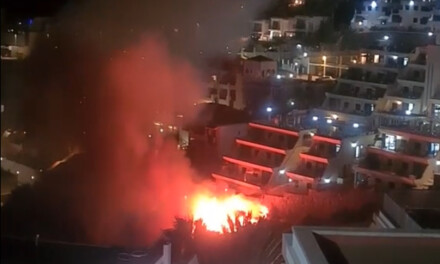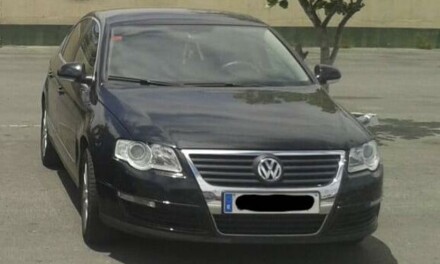The Government Delegation in the Canary Islands indicated on Wednesday that the visible increase in police presence, particularly in Gran Canaria’s southern municipalities of Mogán and San Bartolomé de Tirajana, has contributed to reducing feelings of insecurity expressed by residents, based on reports of “isolated” altercations between migrants temporarily accommodated in empty hotels. The preplanned security round table meetings, agreed last week, took place individually with members of each of the town councils from the tourist municipalities involved, where it was confirmed that the reported acts of criminality, attributed to a very small number of individuals, had already been resolved.
In a statement, the Delegation expressed gratitude for the coordination between the Security Forces and Police and announced that these meetings are set to continue to be held periodically, as promised by the Government delegate in the Canary Islands, Anselmo Pestana, last week while attending local safety board meetings set up for the purpose.
The coordination roundtable was held at the Government Sub-delegation, and attended by the Government Sub-Delegate María Teresa Mayans, the Mayor Conchi Narváez, the General Director of Child and Family Protection, Iratxe Serrano, the president of the Red Cross Antonio Rico, the security councillor Samuel Henríquez, the councillor for Civil Protection and the Red Cross Inés Rodríguez, and the Commissioner of the San Bartolomé de Tirajana Local Police Isidro Armas.
Priority issues have been addressed, migrants who by their own decision or due to bad behavior are out of the centers and the rate of de-escalation of the use of hotels.
 The Red Cross pointed out during one of the security round table meetings, that 72 individuals have been expelled from temporary accommodation, in addition to around 20 who have left on their own initiative, indicating that these cases are “in the hands of the National Police, which in coordination with the Local Police will proceed over the next few days to relocate them to the CIE (Foreigners Internment Centre) for subsequent expulsion.”
The Red Cross pointed out during one of the security round table meetings, that 72 individuals have been expelled from temporary accommodation, in addition to around 20 who have left on their own initiative, indicating that these cases are “in the hands of the National Police, which in coordination with the Local Police will proceed over the next few days to relocate them to the CIE (Foreigners Internment Centre) for subsequent expulsion.”
The Mogán roundtable was attended by urban development, security and tourism councillor Mency Navarro who expressed regret that their municipal town hall was not being supplied with any of the lists of information they have demanded, regarding the numbers and details of the people currently accommodated or expelled, nor has anyone communicated with them regarding the protocols for dealing with those individuals who have subsequently been expelled from accommodation in the south. Mayans agreed to provide information regarding protocols at their next meeting, on Friday of next week.
 It was made clear that any of these people who have been involved in disturbances to public order or who have abandoned the reception facilities, are to be lined up for preferential expulsion, once they are relocated. The deputy delegate of the Spanish Government in Las Palmas, Teresa Mayans , stressed that they are only able to ensure “a limited number of repatriations” but that “that will grow progressively”, along with the “preferential expulsions already being carried out.” She also pointed out that every individual involved is identified to Policia Nacional, who then take responsibility for locating those individuals to ensure they are dealt with appropriately.
It was made clear that any of these people who have been involved in disturbances to public order or who have abandoned the reception facilities, are to be lined up for preferential expulsion, once they are relocated. The deputy delegate of the Spanish Government in Las Palmas, Teresa Mayans , stressed that they are only able to ensure “a limited number of repatriations” but that “that will grow progressively”, along with the “preferential expulsions already being carried out.” She also pointed out that every individual involved is identified to Policia Nacional, who then take responsibility for locating those individuals to ensure they are dealt with appropriately.
They spoke of the de-escalation in the use of hotels, the Red Cross considering “the term established” by the Government Delegation “viable”, who indicated the approximate final date for the vacating of tourist establishments for around mid-February.
Phase 1 of the ‘Canarias 50’ military base facilities is already 100% complete and phase 2 has begun, in addition to the adaptation of other centres on Gran Canaria and other islands that “are progressing at a good pace, making it feasible to comply with the established schedule”.














As a tourist in playa del ingles I am very very worried about the migrant situation in gran canaria.I have noticed large amounts of police ,but to be honest it does NOT make me feel safe.On sat on the beach at playa del ingles there were many many migrants on the beach and sat in the sand dunes that are actually fenced off!there was not a policeman in sight!We are unable to get flights back to the UK ,but to be honest we will be gone as soon as we can.Ifeel the migrants are taking over the place and I feel very intimidated by them and I fear they may actually take over GRAN CANARIA.These migrants are young fit people who I see training on the beach all the time,it would not take much for them to overpower the police here.Please feel free to correct me if I am wrong!I am not racist and I am all for people trying to make a better life for themselves but through the correct channels.
In general the migrants who arrived last year do not want to be here, they want to travel on to mainland Europe. They are not, generally, any bother at all. There has however been a huge rise in xenophobia spread through false information and far right rhetoric, and this has played on legitimate fears and concerns to create a very tense atmosphere in one or two places. In general every migrant we speak to is pretty straight forward and harmless. If you feel you are ever in an emergency situation call 112 where they can speak your language and deploy help if needed. To be clear the problems we are facing are not poor people trying to make a better life for themselves by risking everything, it is generally privileged people with negative attitudes trying to pretend the situation is out of hand. it is not, the police and the government have a very good control over most of what is happening, unfortunately they were too slow to react when they were being warned this time last year what to expect. Don’t worry, if you really feel that there are problems then we can recommend some great hotels on the other side of the island.